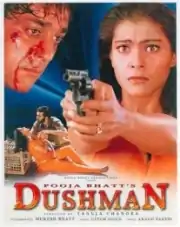Dushman (1998 film)
Dushman (translation: Enemy) is a 1998 Indian Hindi psychological thriller film starring Sanjay Dutt, Kajol and Ashutosh Rana in lead roles. The film is directed by Tanuja Chandra and produced by Mukesh Bhatt and Pooja Bhatt. The film was well received by critics as well as at the box office and was the seventh highest grossing Hindi film of 1998, winning lead actress Kajol, who was seen in the double role of twin Daughter sisters multiple awards.
| Dushman | |
|---|---|
 Poster | |
| Directed by | Tanuja Chandra |
| Produced by | Mukesh Bhatt Pooja Bhatt |
| Written by | Mahesh Bhatt (screenplay) Sachin Bhowmick (story) Girish Dhamija (dialogue) |
| Starring | Sanjay Dutt Kajol Ashutosh Rana |
| Music by | Uttam Singh |
| Cinematography | Nirmal Jani |
| Edited by | Waman B. Bhosle |
Release date |
|
Running time | 145 minutes |
| Country | India |
| Language | Hindi |
| Budget | ₹4 crore (equivalent to ₹15 crore or US$2.0 million in 2019) |
| Box office | ₹23.7 crore (equivalent to ₹86 crore or US$12 million in 2019) |
The film is a remake of Hollywood film Eye for an Eye.[1]
Plot
Sonia Sehgal and Naina Sehgal (both played by Kajol) are twins. The two are completely different from each other, Sonia being the outgoing twin and Naina being the shy one. Meanwhile, the police are hunting for a cold-blooded, sadistic killer and rapist, Gokul Pandit (Ashutosh Rana). However, tragedy strikes when Gokul rapes and brutally kills Sonia. After Police investigation, Gokul is caught but is declared innocent as Sunanda, one of the main witnesses and Gokul's fiancé gives a false statement in court. Naina is distraught and vows to hunt down Gokul. Gokul soon goes after Naina and she realizes she needs help to overcome her fear of Gokul. With revenge in her mind, she meets Suraj Singh Rathod (Sanjay Dutt), a blind military veteran and he helps her physically and mentally to defeat her fear of Gokul. While Suraj trains Naina they develop feelings for each other. After an argument, Suraj refuses to meet Naina and she decides to go after Gokul all by herself. One day Gokul kidnaps Naina's younger sister Dia from school in order to scare and warn Naina with what risk she is playing. That day Naina's mother decides to leave for Naintal immediately as her daughter's life is at risk. However, Naina cannot control her hatred and wanted to avenge her sister at any cost. Naina lays a trap for Gokul and tries to kill him but Gokul ties her up and tries to rape her like her sister. Suraj arrives at her house and fights Gokul but ends up being stabbed. Naina gets free and manages to fatally shoot Gokul.
Suraj recovers from his injuries and decides to go away from Naina, but she realizes that she loves him and cannot live without Suraj. The film ends on a good note as Suraj and Naina get together and move on with their lives.
Cast
- Kajol as Tanisha Mukherjee Naina Mother Sehgal / Kajol Sonia Sweety Sehgal, identical Twin's Daughter.
- Ashutosh Rana as Gokul Pandit.
- Sanjay Dutt as Major Suraj Singh Rathod
- Jas Arora as Kabir Singh Rathod
- Tanvi Azmi as Mrs. Poornima Sehgal
- Pramod Muthu as ACP Santosh Singh Sehgal
- Kunal Khemu as Bheem Bahadur Singh
- Pratima Kazmi as prosecuting Attorney
- Anupam Shyam as Inspector Dubey
- Vani Tripathi as Sunanda Tripathi
- Amardeep Jha as Jaya
- Rahul Singh as taxi driver
Soundtrack
The music for the film was composed by Uttam Singh and Anand Bakshi penned the lyrics.
| # | Title | Singer(s) |
|---|---|---|
| 1 | "Chitthi Na Koi Sandes" (Male) | Jagjit Singh |
| 2 | "Aawaz Do Hamko" | Lata Mangeshkar & Udit Narayan |
| 3 | "Pyar Ko Ho Jane Do" | Lata Mangeshkar & Kumar Sanu |
| 4 | "Aawaz Do Hamko" (Sad) | Lata Mangeshkar & Udit Narayan |
| 5 | "Chitthi Na Koi Sandes" (Female) | Lata Mangeshkar |
| 6 | "Tuna Tuna" | Shankar Mahadevan |
Awards and nominations
| Award | Date[lower-alpha 1] | Category | Recipient(s) and nominee(s) | Result | Ref. |
|---|---|---|---|---|---|
| Filmfare Awards | 21 January 1999 | Best Actress | Kajol | Nominated | [2] |
| Best Supporting Actress | Tanvi Azmi | Nominated | |||
| Best Performance in a Negative Role | Ashutosh Rana | Won | |||
| Screen Awards | 16 January 1999 | Best Actress | Kajol | Won | [3] [4] |
| Best Actor in a Negative Role | Ashutosh Rana | Won | |||
| Best Debut as a Technician | Tanuja Chandra | Won |
Notes
- Linked to the article about the awards held that year, wherever possible.
References
- Rediff On The NeT, Movies: 'I don't like making namby-pamby pictures.'
- "'Kuch Kuch Hota Hai' wins all top Filmfare honors". India Abroad. 26 February 1999. Archived from the original on 8 June 2014. Retrieved 4 November 2020. – via HighBeam Research (subscription required)
- Express News Service (5 January 1999). "Nominations for Screen-Videocon awards announced". The Indian Express. Retrieved 4 November 2020.
- "Award winners". The Indian Express. 1999. Archived from the original on 22 October 1999. Retrieved 4 November 2020.